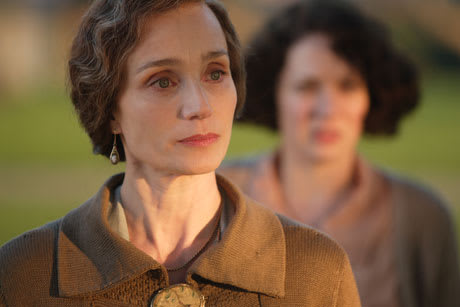With town and country as traditionally diametric referents to bawdy salaciousness and steadfast rigidity, Easy Virtue treads familiar territory without a remarkable depth of insight and some occasionally glib cinematic language, but does so with breezy simplicity and a hallmark beauty that should leave aesthetes drooling. What's more, while slight and forgettable the film boasts a performance from Jessica Biel that doesn't induce snickers, utilizing her particular strengths and more importantly, her weaknesses.
Based on Noel Coward's sharp social commentary, and the last film in silent form by a young Alfred Hitchcock in 1928, this tale plunks American, car racing, woman of her own means Larita (Jessica Biel) into an unlikely marriage with a younger, well-bred Brit name John Whittaker (Ben Barnes). Travelling to his country mansion following unexpected nuptials, the couple are met with contempt by the Whittaker matriarch (Kristen Scott Thomas), whose veiled disapproval of the Yankee skank manifests itself in sassy banter and bitch comments.
While the women of the household can do little more than snarl at the brazen, confident beauty, John's sardonic, world-weary father (Colin Firth) clearly finds intrigue in the new arrival, identifying with her outsider perspective.
Initially an entertaining comedy of manners and inadvertent slights, in the form of panty-less cancans and dead Chihuahuas, the film winds down in the third act with familial melodrama and familiar twists, as everyone gets their requisite comeuppance. It's a bit of a letdown but hardly worth damnation, given the overall amiability of the film.
With costumes and sets all superbly reflecting the '20s in which the film is set, viewers with a particularly stiff upper-lip may find Elliot's modernist direction style and deliberate flourishes off-putting. Others may appreciate the tongue-in-cheek, whimsical manner in which the entire ordeal was intended, not taking such liberties so seriously. There are, after all, no rules saying that period pieces need to be handled in the way of the times they are set.
(Alliance)Based on Noel Coward's sharp social commentary, and the last film in silent form by a young Alfred Hitchcock in 1928, this tale plunks American, car racing, woman of her own means Larita (Jessica Biel) into an unlikely marriage with a younger, well-bred Brit name John Whittaker (Ben Barnes). Travelling to his country mansion following unexpected nuptials, the couple are met with contempt by the Whittaker matriarch (Kristen Scott Thomas), whose veiled disapproval of the Yankee skank manifests itself in sassy banter and bitch comments.
While the women of the household can do little more than snarl at the brazen, confident beauty, John's sardonic, world-weary father (Colin Firth) clearly finds intrigue in the new arrival, identifying with her outsider perspective.
Initially an entertaining comedy of manners and inadvertent slights, in the form of panty-less cancans and dead Chihuahuas, the film winds down in the third act with familial melodrama and familiar twists, as everyone gets their requisite comeuppance. It's a bit of a letdown but hardly worth damnation, given the overall amiability of the film.
With costumes and sets all superbly reflecting the '20s in which the film is set, viewers with a particularly stiff upper-lip may find Elliot's modernist direction style and deliberate flourishes off-putting. Others may appreciate the tongue-in-cheek, whimsical manner in which the entire ordeal was intended, not taking such liberties so seriously. There are, after all, no rules saying that period pieces need to be handled in the way of the times they are set.
